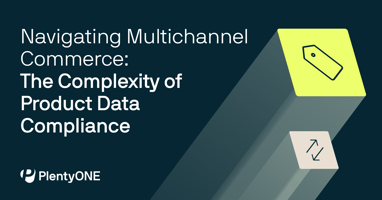Despite subdued growth forecasts, absolute sales figures in e-commerce remain high. Ever since the...
GoBD in Online Retail: What You Need to Know to Stay on the Safe Side.
Do you handle your bookkeeping with absolute precision – and more importantly, do you get it absolutely right?
E-commerce in daily operations: Your online shop is running. Orders arrive every day, generating invoices, credit notes, and other documents. Many processes are automated, allowing you to focus on what really matters. Sounds good, doesn’t it?
But behind the scenes, the archive grows: digital – and maybe even analogue – documents and transactions pile up.
And then it happens: a tax or business audit is announced – or worse, arrives unannounced. A moment that often triggers stress and cautious reflection, or even doubt. After all, a visit from the tax office means:
- Extra work.
- Questions that inevitably arise, even when you’re confident everything has been done correctly: “Has everything been documented with absolute precision?”, “Will the auditors find something we overlooked?”, “Hopefully, the data access process works seamlessly…”
In this article, you’ll learn which requirements your bookkeeping must meet and how to fulfil them effortlessly and efficiently. We’ll share practical tips and to-do lists to help you avoid liabilities and establish a stable, legally compliant foundation for your business. This way, you’ll always be prepared for a tax audit – while securing the long-term future of your company.
This is where GoBD compliance comes into play. It not only ensures legal security and peace of mind but also strengthens trust among partners, customers, and authorities.
The GoBD (Principles for the Proper Management and Storage of Books, Records, and Documents in Electronic Form and for Data Access) have set clear rules since 2015:
- Your bookkeeping must be orderly, traceable, and unalterable.
- The digital management and archiving of your documents are strictly regulated.
- Additionally, the GoBD define standards for monitoring bookkeeping processes, procedural documentation, and internal controls.
Whether you’re a individual entrepreneur or a large company, the GoBD applies to all taxable businesses – including you as an online retailer.
GoBD in Detail: Challenges in E-Commerce
Businesses that fail to comply with the GoBD requirements risk having the formal accuracy of their bookkeeping questioned by auditors.
Ignoring GoBD guidelines can lead to serious consequences, including financial penalties such as fines or tax disadvantages like estimates or the loss of input tax deductions. Additionally, the risk of more intensive tax audits or even criminal investigations increases. Beyond that, non-compliance can severely damage trust in your business, leading to long-term negative impacts on its success.
In short: GoBD compliance is essential.
Shaped by the digitalisation and globalisation of commerce, implementing the GoBD often presents additional challenges for e-commerce businesses.
Take omnichannel operations, for example: managing sales from various channels – from your own webshop to marketplaces and social media platforms – makes data collection and documentation more complex. It requires a well-structured, seamless, and proper recording of all transactions. Similarly, in international sales and cross-border trade – particularly in dropshipping – specific VAT and sales tax requirements must be correctly managed and documented.
The financial administration’s right to access data also causes headaches. Many IT systems lack suitable export interfaces to provide data in a GoBD-compliant manner. Additionally, some data may not be accessible for the entire retention period required.
Another common issue: procedural documentation. For many businesses, it remains a mystery – or, as the saying goes, a book with seven seals.
Did you know?
Office solutions like Word or Excel do not provide a reliable foundation for GoBD-compliant processes. They lack integrated access controls, do not prevent unnoticed changes, and do not automatically log editing steps. For these reasons, the GoBD explicitly identifies the use of such programs as an example of inadmissible practices.
A typical scenario: Transactions recorded electronically in a cash register or inventory management system are transferred via a data interface to an Office Software. There, the data is modified without any logging. The altered information is then re-imported into the original system. Such a process violates GoBD requirements.
Software Solutions as the Key to GoBD Compliance
Online Retail Bookkeeping Simplified and Self-Managed
The devil, as they say, is in the detail. At the core are your digital records and the associated accounting and tax processes. An appropriate software solution can significantly simplify these in line with GoBD standards by addressing the following challenges:
1. Complete and Accurate Data
Record and store all relevant business transactions comprehensively and precisely. This includes invoices, delivery notes, orders, payment data, as well as corrections and cancellation receipts. GoBD-compliant invoicing software ensures completeness, accuracy, timeliness, organisation, durability, and immutability of your records.
2. Traceability and Verifiability
Organise your data clearly and link it to the corresponding records. A good accounting software simplifies this by connecting booking information and processing steps directly with the associated record. A revision-proof file format and the fixed association of bookings with their records ensure transparency and traceability.Ideally, other important documents such as price agreements, contracts, or emails, including attachments, should also be linked and archived. Particularly useful are solutions that offer an Outlook plugin, allowing you to transfer relevant emails directly and seamlessly into your ERP system or accounting software.
3. Immutability
While subsequent changes are permitted, they must be fully and transparently logged. This ensures the original content is preserved, and every transaction can be clearly traced from start to finish. As a result, you can always rely on unaltered and reliable records.
4. Timely Recording
GoBD-compliant software solutions support this by providing real-time reports and giving you direct access to all critical data.
5. Direct Data Access & Machine-Readable Evaluations
Additionally, make sure your software can evaluate documents automatically by selecting the appropriate format. A full-text search function is particularly useful for locating specific documents. When an auditor enters a keyword, the software should display all relevant documents containing that keyword.
6. Retention Period
Electronically stored documents and data must be retained for ten years. For business records such as emails, the retention period ranges from six to ten years, depending on their content.
7. Procedural Documentation
The procedural documentation acts as a handbook. The GoBD requires you to provide a comprehensive record detailing the entire organisational and technical process of archiving, including the techniques used and the individuals involved. At the same time, you must document the separation of duties within your organisation as part of the internal control system.This handbook enables the tax authorities to accurately review and trace every digital process during an audit. Modern accounting programs make it possible to create different workflows and assign responsibilities for various business transactions, thereby ensuring the traceability of all tax-relevant digital processes in an automated manner.
8. Security
Protect all electronic data from unauthorised access and data loss. This can be achieved through technical measures such as access controls with secure passwords or the use of electronic signatures – a standard feature in software solutions.
Whether you choose specialised accounting software or an e-commerce ERP system, the decision should be based on your individual requirements. Ensure that the solution is tailored specifically to online retail, complies with all GoBD standards, is regularly updated, and offers reliable support.
Cloud software provides the advantage of redundant data storage on secure servers – meaning your data is stored at least twice in different server locations. If you use a cloud solution, make sure it operates on servers governed by EU law. Choosing software hosted in Germany or the EU ensures you remain on legally safe ground. Systems hosted outside the EU – for example, in the USA – often violate local data protection regulations by granting third parties, such as intelligence agencies, access through a "backdoor."
Certified for Compliance
IDW PS 880 – Your Guarantee of Security and Control
PlentyONE is certified according to IDW PS 880 – an official auditing standard established by the Institute of Public Auditors in Germany. This standard defines clear guidelines for the accuracy, security, and control of IT-supported processes. Its goal is to ensure the integrity and availability of documents over the long term.
An IDW PS 880 certification demonstrates that a software solution guarantees reliable, traceable, and tamper-proof processes. As an online retailer, this provides you with a legally compliant foundation that enables your business to confidently pass even the most stringent audits.
Conclusion: Navigating Every Audit with the Right Software
What was once the GDPdU has evolved into the GoBD. With the November 2014 BMF letter, the tax authorities updated the principles for proper electronic bookkeeping. Consistent compliance with these guidelines ensures the long-term stability and credibility of your business.
Choose software that sustainably simplifies your daily operations and guides you safely through every audit. A certified solution like PlentyONE supports you in meeting all relevant GoBD requirements.
Proper bookkeeping is also a team effort. Train your staff, establish transparent processes, and rely on trusted technologies that are regularly reviewed by experts. This lays a solid foundation for the success and future of your business.
Discover what PlentyONE can do to make your life in e-commerce easier, safer, and smoother.
Disclaimer: This blog post is for informational purposes only and does not constitute legal advice. If in doubt, we recommend consulting a tax advisor or legal professional.




